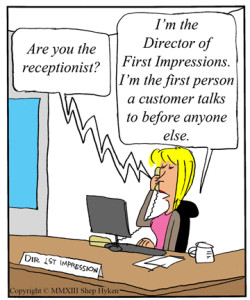Rebranding Job Titles: An Innovative Approach or a Goofy Gimmick?
Today we have a great guest post from Verbal Branding Associate Rachel Loucks!
Say you’re at a cocktail party and you introduce yourself to a fellow invitee. After a few minutes of pleasant conversation, you ask what he does for a living. He replies that he is the “Ambassador of Buzz” at his firm. What do you think in that moment?
Taylor Aldredge, who holds that very job title at a virtual phone company Grasshopper, says people are often intrigued.
“Just telling people my title gets a conversation going about Grasshopper and what we do,” he says.
And Grasshopper isn’t the only company cashing in on the intrigue generated. Job titles like these seem to be cropping up more and more, and not just in the tech startups that initiated the trend; more traditionally run organizations are now increasingly using titles such as Media Gurus, Sales Ninjas, Officers of First Impressions, Copy Crunchers, Directors of Spark, Marketing Rockstars  and Problem Wranglers.
and Problem Wranglers.
From a branding perspective, a distinctive job label can be a fun way to make employees and their companies stand out, and give outsiders a snapshot of the organization’s values and sense of identity.
As Carlos Jimenez, President of the marketing solutions firm The Zella Company, asserts, “Funky job titles can serve as an extension of a company’s brand and indicate that you are a company with a fun culture that doesn’t take itself too seriously.”
And who doesn’t want to be the fun, cool company?
Well, call me the Bearer of Bad News (ha!), but rebranding job titles is probably not the best move for your organization. Why, you ask? Here are a few reasons:
1. Whimsical job titles are often confusing and vague.
What does a Director of Spark actually do? How are the responsibilities of a Word Herder different from a Copy Cruncher? These are valid questions that are made all the more concerning when one remembers what a job title’s number one purpose is; to clearly and succinctly communicate the role’s function within the organization.
If we think of a company as the master brand, and job titles as sub brands, then it follows that there should be some sort of systematic brand architecture that denotes various positions and levels within the organization. Wacky job labels muddy up this branding architecture by obscuring the title’s place in the overall corporate structure. Monster.com’s Kathy O’Reilly cleverly muses, “Folks love trendy titles, but does it create a career path? Where do you go from ninja? To samurai? Not likely.”
2. They have the potential to limit, rather than enhance, your audience.
It’s true that an off-the-wall job label can help you stand out, but it can also make you hard to find. If applicants are searching for positions within your organization, they might not know to look up “Social Media Butler” instead of Communications Manager.
In the same vein, if the resume of your ideal employee has “Sales Rockstar” on it, but the position you’re looking to fill is a “Business Development Dynamo” the likelihood that your HR’s applicant tracking software will find it are much slimmer. Having fanciful titles may require a company to do more compensatory legwork via search engine optimization, recruiting, and marketing efforts, in order to maintain visibility. Moreover, a company should consider its client/customer base before moving to zany monikers.
Brand consultant Lisa Merriam points out, “Your team might think you’re hip and edgy. Potential clients might think you are lame.” If the people or companies you’re trying to do business with won’t understand or appreciate the change, you may only succeed in alienating them.
3. They likely don’t fit with your company’s overall image.
There is a reason why job labels like Apple Genius, Starbucks Barista, and Best Buy Geek Squad member are compelling—they are both pertinent and intimately tied to their company’s persona. But not all company personas lend themselves to imaginative titling.
If your organization’s image is all about being serious, established, and professional, an eccentric job title will not only fail to convey that, but could undermine it. Another big mistake that companies make regarding trendy job titles is that they don’t actually create something new or unique to their brand. By having multiple organizations adopt the titles “Media Guru” or 
“Problem Wrangler,” for example, something that was innovative and fitting for one organization becomes trite and out-of-place for others. And while they may think they’re being cool or staying relevant, copycat companies are simply finding new ways to be cliché.
4. Rebranding job titles won’t magically rebrand your company.
Corporations in need of a brand makeover may think that handing out fun, fresh job titles is an easy way to become more progressive and cutting-edge, and to boost office creativity and morale. But these companies often fail to realize that unique job titles are often a symptom of a progressive corporate environment, rather than a catalyst for one. Even the most creative job titles will not solve the deeper, underlying issues a corporate brand might be struggling with, and slapping on a funky label will certainly not change an inherently bad company climate.
Business author Shep Hyken wisely states, “While these different and whimsical titles or labels are fun, they can’t change the culture. Sure, they can create a feeling, but there has to be a management style and system to support it. Otherwise, it’s just lip service.”
A company’s brand is so much more than the sum of its parts, and if the company wants to step up its job-title bark, it needs to have the bite to back it up.
So here’s the moral of the story: pulling off quirky job titles is difficult to do well, and for many of us, it simply may not be in our company’s DNA. And that’s okay! It’s more important to stay true to your corporate brand than join in on a trend that just doesn’t work for you.
Still convinced that your workplace would be better if everyone had a catchy title? Then just remember to be strategically creative. Craft job titles that are still descriptive and fit in with a larger brand architecture; make sure they widen rather than diminish your audience; and work to ensure that the designations are unique to your company and its ethos.
Would I have more fun telling fellow cocktail party-goers that I was a Strategic Neologist? Perhaps. But Verbal Branding Associate will work just fine.
Image Sources:
http://www.bostonglobe.com/lifestyle/style/2013/02/06/creative-job-titles-start-pop-traditional-companies-not-just-tech/BeCSRnSmOK8wPoq9bGHBdL/story.html
http://www.hyken.com/customer-experience-2/creative-job-titles-help-create-and-define-corporate-culture/
Addison Whitney is a global branding firm with a passion for building strong brands.
To learn more about Addison Whitney, visit our website at AddisonWhitney.com, or contact us here.